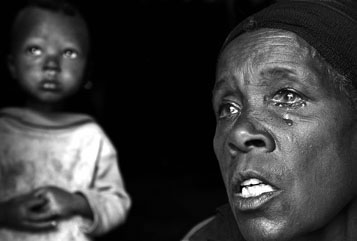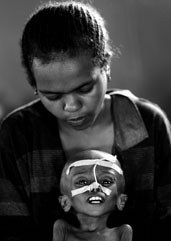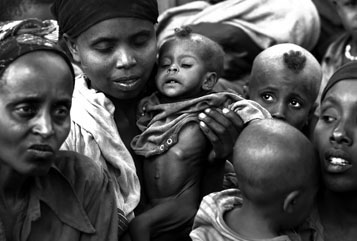 Government and U.N. action has averted an immediate hunger emergency in Ethiopia, but high food prices are still making it hard for parents to feed their children, a major medical charity said.
Government and U.N. action has averted an immediate hunger emergency in Ethiopia, but high food prices are still making it hard for parents to feed their children, a major medical charity said.
The cost of teff grain -- used to make the thin, round spongy bread that accompanies most Ethiopian meals -- has more than doubled in the past year, and lentils have quadrupled in price, said International Medical Corps (IMC).
"There is a food shortage," IMC's country director in Ethiopia, Seifu Woldeamanuel, told Reuters in a telephone interview from Addis Ababa. "I don't know how people will cope if no food is injected."
This year, aid agencies have issued warnings about similar problems in nearby countries dealing with the overlap of drought and high global food prices -- Somalia, Kenya, Djibouti and parts of Uganda.

The outlook in Ethiopia is a little less bleak than it was a few weeks ago, when Woldeamanuel raised the alarm about a brewing food emergency.
The shorter of two annual rainy seasons had failed, and aid agencies had said people did not have enough potatoes and sweet potatoes to get them through until next harvest. Sharp rises in global food prices were also taking a toll.At the same time, the U.N. World Food Programme (WFP) was warning it could not afford to provide for hungry Ethiopians, and the U.N. children's fund, UNICEF, said as many as 6 million children under five were at risk of acute malnutrition.
Now respite has arrived on several fronts -- the rains have come, and the government and WFP have stepped up their promises of food aid. Woldeamanuel said the extra food would not only feed people but help bring prices down.
"WFP is normally the only source when there's drought or shortage ... (and it) didn't have enough. Now it seems they're planning to find more," Woldeamanuel said. "It's in control (now). We're expecting food to come."
Ethiopia accused some aid agencies last month of exaggerating the drought's impact to raise money under false pretences.It acknowledged that some 4.6 million people and around 75,000 children needed help because of the failure of the March-April rains, but said that did not add up to a famine.Woldeamanuel said he was still concerned about some parts of the country -- particularly Oromia in the southwest -- where aid workers say more children than usual are being brought to feeding centres in need of 24-hour care.According to the U.N. Department of Economic and Social Affairs, more than 83 percent of Ethiopia's 81 million people live in rural areas. Most families farm their own food, which is risky in a country regularly ravaged by drought.The World Bank says Ethiopia needs to rethink its dependence on subsistence agriculture and Woldeamanuel said the country needed to find alternative ways of creating employment and modernise its farming -- for example by introducing small-scale irrigation to increase yields. (For the latest humanitarian news visit Reuters AlertNet http://www.alertnet.org/)

-The wealth of a soul is measured by how much it can feel; its poverty by how little.-
zOBaNaNaS

1 comments:
I didn't understand the concluding part of your article, could you please explain it more?
Post a Comment